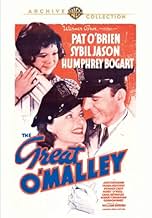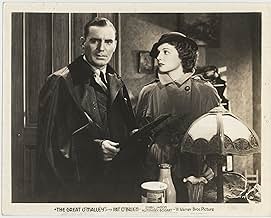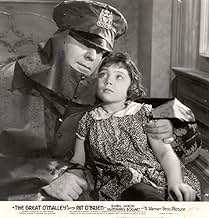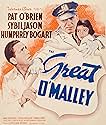Aggiungi una trama nella tua linguaA by-the-book patrolman who cares more about the letter of the law than justice feels guilty when his inflexibility sends a family man to prison.A by-the-book patrolman who cares more about the letter of the law than justice feels guilty when his inflexibility sends a family man to prison.A by-the-book patrolman who cares more about the letter of the law than justice feels guilty when his inflexibility sends a family man to prison.
- Regia
- Sceneggiatura
- Star
Frieda Inescort
- Mrs. Phillips
- (as Frieda Inescourt)
Joseph Allen Sr.
- Warden
- (non citato nei titoli originali)
Granville Bates
- Jake - Bar Proprietor
- (non citato nei titoli originali)
Recensioni in evidenza
Pat O'Brien plays John O'Malley, a New York City beat cop who thinks that enforcing the law is all mechanics and no heart. He tickets businessmen for having awnings that are inches too long, threatens to cite his own mother for spreading debris when she feeds bread to the pigeons from her kitchen window, and cites John Phillips (Humphrey Bogart) for a loud muffler when he is on his way to the first job he has had in years - remember this is the Great Depression. This sets off a string of tragic events starting with Phillips being late to his job and thus losing it, then being too proud to tell his wife and crippled daughter (Sybil Jason) that he lost the job, and finally an altercation at a pawn shop where Phillips was trying to pawn his gun and WWI medals that turns into a robbery. Philips goes to prison, and O'Malley becomes the laughing stock of the force and a target of the press as an example of law enforcement abuse.
All the while, O'Malley holds tight to his belief that he is just doing his job by enforcing all the law the all the time by the book. His captain wants his resignation, and when O'Malley won't give it, he has him assigned to public school crossing guard duty. The captain believes this will break or make the man. Did I mention that Phillips' little daughter goes to the same elementary school where O'Malley is assigned, and they strike up a friendship, neither one knowing who the other is? A romantic and humanizing interest comes in the person of Ann Sheridan as a schoolteacher at the elementary school.
This is a pleasant little early production code era entry, with O'Brien playing the same kind of hard boiled egg he played before the code, but this time donning a policeman's uniform. The only negative in the film, in my opinion, was a common device in films of the mid 30's - a child that is sickly-sticky sweet (Sybil Jason's character) over-sentimentalizing matters and sucking the adult cast into more than a few silly situations. However, at least here the child star is central to the plot. All in all, recommended especially for fans of Pat O'Brien and Ann Sheridan and anybody that is interested in a film in which Sybil Jason is actually billed above Humphrey Bogart - an odd sight indeed some 75 years later.
All the while, O'Malley holds tight to his belief that he is just doing his job by enforcing all the law the all the time by the book. His captain wants his resignation, and when O'Malley won't give it, he has him assigned to public school crossing guard duty. The captain believes this will break or make the man. Did I mention that Phillips' little daughter goes to the same elementary school where O'Malley is assigned, and they strike up a friendship, neither one knowing who the other is? A romantic and humanizing interest comes in the person of Ann Sheridan as a schoolteacher at the elementary school.
This is a pleasant little early production code era entry, with O'Brien playing the same kind of hard boiled egg he played before the code, but this time donning a policeman's uniform. The only negative in the film, in my opinion, was a common device in films of the mid 30's - a child that is sickly-sticky sweet (Sybil Jason's character) over-sentimentalizing matters and sucking the adult cast into more than a few silly situations. However, at least here the child star is central to the plot. All in all, recommended especially for fans of Pat O'Brien and Ann Sheridan and anybody that is interested in a film in which Sybil Jason is actually billed above Humphrey Bogart - an odd sight indeed some 75 years later.
A first-rate movie in every sense. I recently watched it for the first time in decades and was I was every bit as impressed with it as I was the first time I saw it. Pat O'Brien was great, and you very seldom see a young child turn in a performance that's nearly as good as the one by Sybil Jason in this film. It's a shame that more people aren't aware of this movie, but, of course, a lot of great films, such as this 1937 gem, become forgotten about over time. Let's just hope that more people get to see it. It's on You Tube. And I don't mind saying that I got pretty emotional at times. I highly recommend it!
Overall this is a particularly good film. Top-notch acting and direction, an involving plot, realistic scenery. A gaggle of veteran and up-and-coming actors deliver worthy, multi-dimensional performances that make us care about their characters. Pat O'Brien, always reliable as a fast-talking, rough and tough, take charge and take no prisoners character here gives a much more nuanced performance than is his usual. Donald Crisp is reliable as always as O'Brien's boss. Sybil Jason, the South-African wunderkind, was very endearing and a professional despite her age. It's too bad she didn't make it as she grew older. Then there's Humphrey Bogart, Frieda Inescourt, and Ann Sheridan who would all go to much bigger and better things.
So what's my beef? Well, let's consider the basic premise of the film: a man (Bogart) is on his way to work in a beat-up car with faulty exhaust and is given a ticket by an overzealous cop (O'Brien). The delay causes him to lose his job and in desperation he commits a burglary which lands him in prison. OK, so the cop didn't have to cite him for such a minor offense and even after he stopped him, could have believed him and let him go. But this is exactly where the logic is flawed and we find out how in the next few minutes. When Bogart tries to pawn some items the pawnbroker asks him why he doesn't go on relief to which Bogart replies that he wouldn't take any handouts. And there you have it. Had the man been on relief he could have fixed his muffler which would have given the cop no reason to stop him and he would have made it to his job on time. But no, in true pioneer spirit, rather than ask for government help (which after all he contributed to with his taxes) and preferring false pride to responsibility to his family he runs foul of the law and ends up in the clink completely powerless. And to me that's stupid.
Now I'll get off my pedestal and stop sermonizing. "The Great O'Malley" many not be masterpiece but it certainly bears watching and a worthy addition to anyone's collection.
So what's my beef? Well, let's consider the basic premise of the film: a man (Bogart) is on his way to work in a beat-up car with faulty exhaust and is given a ticket by an overzealous cop (O'Brien). The delay causes him to lose his job and in desperation he commits a burglary which lands him in prison. OK, so the cop didn't have to cite him for such a minor offense and even after he stopped him, could have believed him and let him go. But this is exactly where the logic is flawed and we find out how in the next few minutes. When Bogart tries to pawn some items the pawnbroker asks him why he doesn't go on relief to which Bogart replies that he wouldn't take any handouts. And there you have it. Had the man been on relief he could have fixed his muffler which would have given the cop no reason to stop him and he would have made it to his job on time. But no, in true pioneer spirit, rather than ask for government help (which after all he contributed to with his taxes) and preferring false pride to responsibility to his family he runs foul of the law and ends up in the clink completely powerless. And to me that's stupid.
Now I'll get off my pedestal and stop sermonizing. "The Great O'Malley" many not be masterpiece but it certainly bears watching and a worthy addition to anyone's collection.
I didn't mind at all that this was predictable and formulaic-- I like the sappy stuff. Who's a better Irish cop than Pat O'Brien? And it's a treat to see early Ann Sheridan and Bogart. The Production Code guaranteed that justice, and not just the letter of the law, would be done.
I noticed that Father Patrick was played by Father Sheridan, but it appears that he was no relation to the lovely Ann. He had quite a long career in films, beginning with silents in 1915.
It was really a cheap shot for Warners to release a publicity tagline such as "a Hot-Headed Irish Cop Comes to Grips with a Cold-Blooded Killer..." to rope in audiences who'd be expecting a crime thriller instead of a heart-warming tale of a mean cop's redemption.
Heart-warming is fine with me.
I noticed that Father Patrick was played by Father Sheridan, but it appears that he was no relation to the lovely Ann. He had quite a long career in films, beginning with silents in 1915.
It was really a cheap shot for Warners to release a publicity tagline such as "a Hot-Headed Irish Cop Comes to Grips with a Cold-Blooded Killer..." to rope in audiences who'd be expecting a crime thriller instead of a heart-warming tale of a mean cop's redemption.
Heart-warming is fine with me.
This film is about an above the board policeman who learns that having a little heart along with the necessity to do what is right goes a long way. Bogart is playing a small but significant role as the well meaning every day Joe that gets caught up in the circumstances of poverty. Still the show is all O'Brien's as we see him go through a range of emotions from start to finish. Worth watching.
Lo sapevi?
- QuizThe name of an Italian woman in an article read aloud is given as Signora Bacciagalupe. This is an Italian-American slang word meaning "moron."
- BlooperO'Malley frequently refers to a small book, about the size of a an address book, which he says contains the penal code of New York City. An actual such book would be much larger and would be several hundred pages long, as indeed is shown when the judge consults his own copy.
- Citazioni
Captain Cromwell: [Referring to O'Malley] That guy's brains run with nothing but city ordinances. He spends all his time studying his manual. He picks laws out of the air from wastebaskets, from graveyards! He thinks of things that were enacted when Times Square was a hog ranch.
- ConnessioniFeatured in Breakdowns of 1937 (1937)
- Colonne sonoreAmerica
(1831) (uncredited)
aka "My Country 'tis of Thee"
Melody from "God Save the Queen"
Traditional
Words by Samuel Francis Smith
Sung a cappella by the schoolchildren
I più visti
Accedi per valutare e creare un elenco di titoli salvati per ottenere consigli personalizzati
Dettagli
- Data di uscita
- Paese di origine
- Lingue
- Celebre anche come
- The Making of O'Malley
- Luoghi delle riprese
- Azienda produttrice
- Vedi altri crediti dell’azienda su IMDbPro
- Tempo di esecuzione
- 1h 11min(71 min)
- Colore
- Mix di suoni
- Proporzioni
- 1.37 : 1
Contribuisci a questa pagina
Suggerisci una modifica o aggiungi i contenuti mancanti




































